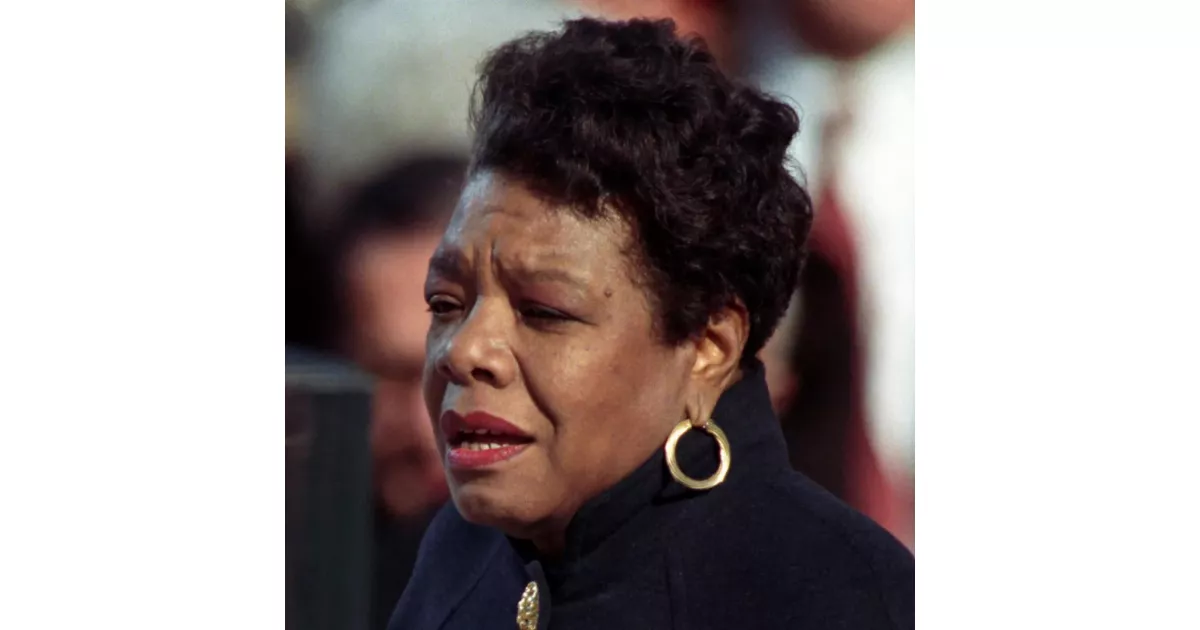Maya Angelou was a celebrated American memoirist, poet, and civil rights activist with a prolific career spanning over 50 years. She is best known for her seven autobiographies, the first of which, "I Know Why the Caged Bird Sings," brought her international acclaim. This autobiography details her life up to the age of 17. In addition to her autobiographical works, she published several books of essays and poetry, and contributed to a wide range of plays, movies, and television shows. Throughout her career, Angelou received numerous accolades, including dozens of awards and over 50 honorary degrees.
April 4, 1928: Birth of Maya Angelou
Maya Angelou was born Marguerite Annie Johnson on April 4, 1928.
1951: Marriage to Tosh Angelos
Maya Angelou married Tosh Angelos in 1951.
1954: Professional Name Change and European Tour
In 1954, she adopted the professional name "Maya Angelou" and toured Europe with the opera "Porgy and Bess".
1955: European Tour with Porgy and Bess
During 1955, Maya Angelou continued touring Europe with a production of the opera Porgy and Bess.
1957: Miss Calypso Album Release
In 1957, Maya Angelou released her first album, "Miss Calypso".
1959: Move to New York and Harlem Writers Guild
In 1959, Maya Angelou moved to New York and joined the Harlem Writers Guild.
September 19, 1960: Support for Fidel Castro
On September 19, 1960, Maya Angelou joined the crowd cheering for Fidel Castro in Harlem.
1961: Performance in The Blacks and Meeting Vusumzi Make
In 1961, Angelou performed in Jean Genet's play "The Blacks" and met Vusumzi Make.
1961: Relationship with Vusumzi Make
Maya Angelou began her relationship with Vusumzi Make in 1961. They never formally married.
1965: Return to the U.S. and Witnessing Watts Riots
Angelou returned to the U.S. in 1965 and witnessed the Watts riots.
1965: Work and Life in Ghana
By 1965, Angelou was working as an administrator at the University of Ghana and contributing to various media outlets.
1967: Return to New York
Maya Angelou returned to New York in 1967 to focus on her writing.
1968: A Year of Pain, Loss, and Genius
1968 marked a tragic turning point for Maya Angelou. Martin Luther King Jr.'s assassination on her birthday deeply affected her. Despite this, she demonstrated resilience by creating the documentary series "Blacks, Blues, Black!" and beginning work on her acclaimed autobiography, "I Know Why the Caged Bird Sings".
1969: Publication of I Know Why the Caged Bird Sings
In 1969, Maya Angelou published her autobiography, I Know Why the Caged Bird Sings, which garnered significant recognition for its groundbreaking portrayal of a Black woman's life and experiences.
1971: Publication of "Just Give Me a Cool Drink of Water 'fore I Diiie"
Maya Angelou's poetry volume "Just Give Me a Cool Drink of Water 'fore I Diiie" was published in 1971 and nominated for a Pulitzer Prize.
1972: Georgia, Georgia Screenplay
In 1972, Maya Angelou wrote the screenplay for Georgia, Georgia, which was the first original script by a Black woman to be produced.
1972: Georgia, Georgia: A Milestone in Film
In 1972, Maya Angelou's screenplay "Georgia, Georgia" became the first produced screenplay by a Black woman, marking a significant achievement in film history. She also composed the film's soundtrack.
1973: Marriage and a Tony Nomination
1973 was a year of personal and professional milestones for Angelou. She married Paul du Feu and received a Tony Award nomination for her role in the play "Look Away".
1973: Tony Award Nomination
Maya Angelou was nominated for a Tony Award for her role in the 1973 play Look Away.
1974: Marriage to Paul du Feu
Maya Angelou married Paul du Feu in 1974.
1977: Appearance in "Roots" and Growing Recognition
In 1977, Angelou appeared in the acclaimed miniseries "Roots" and continued to receive numerous awards and honorary degrees, solidifying her status as a prominent figure.
1977: Roots Mini-series
In 1977, Maya Angelou appeared in the television mini-series Roots.
1981: Reynolds Professorship at Wake Forest
In 1981, Angelou accepted the lifetime Reynolds Professorship of American Studies at Wake Forest University, embracing her role as a "teacher who writes."
1981: Divorce and a Return to the South
In 1981, Angelou divorced Paul du Feu and returned to the southern United States to confront her past, embarking on a new chapter in her life.
1981: Grandson's Disappearance
The mother of Maya Angelou's grandson disappeared with him in 1981. It took four years to locate him.
1982: Appointment at Wake Forest University
In 1982, Maya Angelou became the first Reynolds Professor of American Studies at Wake Forest University.
1986: Publication of "All God's Children Need Traveling Shoes"
Maya Angelou published her fifth autobiography, "All God's Children Need Traveling Shoes", in 1986.
1988: Directing "Moon on a Rainbow Shawl"
In 1988, Angelou furthered her theatrical career by directing a revival of Errol John's play "Moon on a Rainbow Shawl" in London.
1989: Angelou Discusses Writing Process
In a 1989 interview with the British Broadcasting Corporation (BBC), Maya Angelou described her writing ritual, which involved renting a hotel room and writing on legal pads. She explained how she used this process to access memories and "tell the human truth" about her life.
1990: Start of ALA's Most Challenged Books List Inclusion
I Know Why the Caged Bird Sings was frequently challenged from 1990 to 2000, appearing third on the ALA's list.
1991: Death of Vivian Baxter
Maya Angelou's mother, Vivian Baxter, passed away in 1991.
1992: Comparison to 1992 Sales
Angelou's book sales in January 1993 vastly exceeded those of the entire year of 1992.
January 1993: Sales Surge and Reprint
In January 1993, following a public reading, Angelou's book sales dramatically increased, prompting Random House to reprint 400,000 copies.
1993: "On the Pulse of Morning" Recital
Angelou recited her poem "On the Pulse of Morning" at President Bill Clinton's inauguration in 1993.
1993: Inaugural Poem for Bill Clinton
In 1993, Angelou delivered her powerful poem "On the Pulse of Morning" at President Bill Clinton's inauguration, becoming the first poet to do so since Robert Frost in 1961. This brought her wider recognition and a Grammy Award.
1993: Inaugural Recitation
Maya Angelou recited her poem "On the Pulse of Morning" at President Bill Clinton's inauguration in 1993.
1994: Spingarn Medal
In 1994, Angelou was awarded the Spingarn Medal.
June 1995: "A Brave and Startling Truth" at the UN
In June 1995, Angelou presented her poem "A Brave and Startling Truth" at the 50th anniversary of the United Nations.
1995: Angelou Discusses Her Life
In a 1995 interview, Maya Angelou discussed various aspects of her life and career.
1996: Film Direction and Music Collaboration
1996 was a year of diverse creative endeavors for Angelou. She directed her first feature film, "Down in the Delta," and collaborated with Ashford & Simpson on their album "Been Found".
1996: Miss Calypso Re-release
Angelou's album "Miss Calypso" was reissued on CD in 1996.
1997: Caged Bird Analysis in Stories of Resilience in Childhood
Daniel Challener analyzed events in Caged Bird for his 1997 book Stories of Resilience in Childhood.
1998: Down in the Delta Directorial Debut
In 1998, Maya Angelou directed Down in the Delta, becoming the first African American woman to direct a major motion picture.
2000: Hallmark Collection
In 2000, Angelou launched a successful collection of products for Hallmark, further expanding her reach and influence as "the people's poet."
2000: National Medal of Arts
Maya Angelou received the National Medal of Arts in 2000.
2000: Death of Bailey Johnson Jr.
Maya Angelou's brother, Bailey Johnson Jr., died in 2000 after suffering a series of strokes.
2000: End of ALA's Most Challenged Books List Inclusion, and beginning of 2000-2009 List Inclusion
The book continued to be challenged into the 2000s, appearing sixth on the ALA's list for 2000-2009 and marking the end of its inclusion on the prior list.
2002: Publication of "A Song Flung Up to Heaven"
In 2002, Angelou published "A Song Flung Up to Heaven," the sixth installment in her autobiographical series.
2004: Purchase of Harlem Brownstone
In 2004, Maya Angelou purchased a brownstone in Harlem. It housed her extensive book collection and artwork.
2004: Publication of "Hallelujah! The Welcome Table"
Maya Angelou published her first cookbook, "Hallelujah! The Welcome Table", in 2004.
2008: Political Activism and Support for Obama
In 2008, Angelou actively campaigned for Hillary Clinton and later Barack Obama, celebrating his historic victory as the first African American president.
2008: Angelou's Ancestry Revealed
In 2008, DNA testing and a PBS documentary revealed details about Maya Angelou's ancestry. The DNA test showed that 45% of her African ancestors were from the Congo-Angola region and 55% were from West Africa. The documentary explored the story of her maternal great-grandmother, Mary Lee, and her relationship with her former owner, John Savin, after the Civil War.
2008: Letter to My Daughter Publication
Maya Angelou published her third book of essays, Letter to My Daughter, in 2008.
2009: Erroneous Hospitalization Report
In 2009, TMZ falsely reported that Maya Angelou had been hospitalized, leading to rumors of her death.
2009: End of ALA's 2000-2009 Most Challenged Books List Inclusion
Up until 2009, I Know Why the Caged Bird Sings remained on the ALA's Most Challenged Books list.
2010: Donation to Schomburg Center
In late 2010, Angelou donated her personal papers and career memorabilia to the Schomburg Center for Research in Black Culture, preserving a valuable record of her life and work.
2010: Publication of "Great Food, All Day Long"
Maya Angelou published her second cookbook, "Great Food, All Day Long: Cook Splendidly, Eat Smart", in 2010.
2011: Final Course at Wake Forest
Angelou taught her last course at Wake Forest University in 2011, concluding a long and influential tenure.
2011: Consulting on the MLK Memorial
In 2011, Angelou served as a consultant for the Martin Luther King, Jr. Memorial and advocated for changes to a controversial inscription.
2011: Presidential Medal of Freedom
In 2011, Maya Angelou was awarded the Presidential Medal of Freedom.
2011: Robert Loomis Retirement
Maya Angelou's longtime editor, Robert Loomis, retired from Random House in 2011.
2013: Publication of "Mom & Me & Mom"
At age 85, Maya Angelou published her seventh autobiography, "Mom & Me & Mom", in 2013.
2013: Final Speaking Engagement at Wake Forest
In 2013, Angelou gave her final speaking engagement at Wake Forest University.
May 28, 2014: Death of Maya Angelou
Maya Angelou passed away on May 28, 2014.
May 29, 2014: Public Memorial Service
A public memorial service was held for Maya Angelou at Mount Zion Baptist Church in Winston-Salem on May 29, 2014.
2014: Planned Course at Wake Forest
Angelou had planned to teach another course at Wake Forest in late 2014.
2014: Lifetime Achievement Award
In 2014, Maya Angelou received a lifetime achievement award from the Conference of Minority Transportation Officials.
2021: Announcement of Quarter Design
In 2021, The U.S. Mint announced Angelou's likeness for inclusion on the quarter.
January 2022: First Black Woman on US Quarter
In January 2022, Maya Angelou became the first Black woman to be featured on a US quarter as part of the American Women quarters series.
Mentioned in this timeline

Bill Clinton the nd U S President - served as...

Martin Luther King Jr was a pivotal leader in the...

Barack Obama the th U S President - was the...

Hillary Diane Rodham Clinton is an American politician lawyer and...
Africa is the second-largest and second-most populous continent comprising of...
TMZ is a tabloid news organization focused on entertainment and...
Trending

4 months ago Silver Soars Above $50 Amidst Economic and Geopolitical Turmoil: A Four-Decade Peak

8 months ago Stock Market Climbs Amidst Moody's Downgrade and Debt Concerns: Key Takeaways

2 months ago Bitwise Launches XRP ETF Amidst Market Activity; XRP Staking Explored.

10 months ago Milo Manheim and Liz Gillies bond in Little Shop of Horrors, extend run.

4 months ago Archer Aviation's Stock Soars Amid Flight Test Success and Air Show Announcement.

8 months ago Bailey Zimmerman Serves Chicken, Announces New Album 'Different Night Same Rodeo'
Popular

Thomas Douglas Homan is an American law enforcement officer who...

William Franklin Graham III commonly known as Franklin Graham is...

Jupiter is the fifth and largest planet from the Sun...

XXXTentacion born Jahseh Dwayne Ricardo Onfroy was a controversial yet...

Kristi Noem is an American politician who has served as...

Instagram is a photo and video-sharing social networking service owned...
